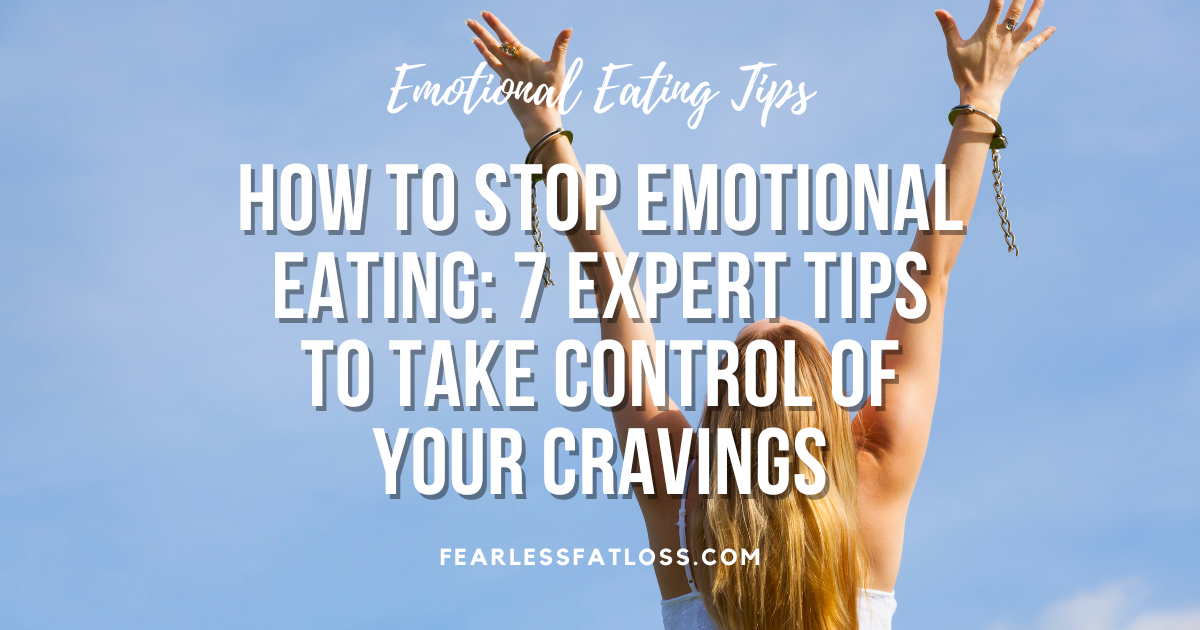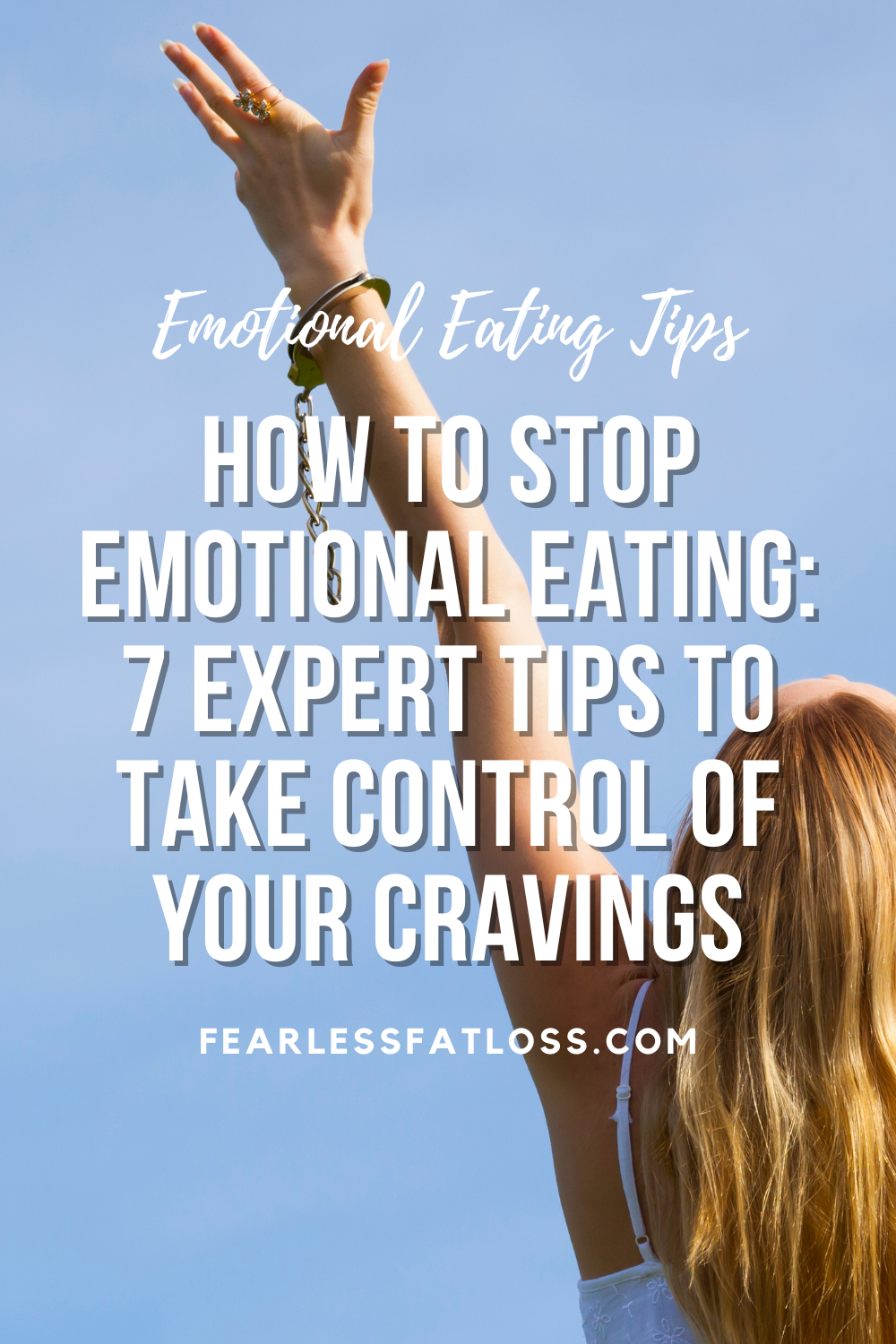How to Stop Emotional Eating: 7 Expert Tips to Take Control of Your Cravings
Before we get into my 7 expert tips for how to stop emotional eating, I just want you to know that I understand how frustrating it can be to want to lose weight, but you can’t stop emotional eating no matter how many diets you do.
Either you don’t know how to stop emotional eating, or you have some information on how to stop emotional eating but you haven’t been able to break free on your own.
While it’s true that I’ve been a professional mind-body weight loss coach since 2009, I’ve also had the experience of struggling with emotional eating personally. I think this makes me an even better coach, since I do understand what it’s like, but you don’t want to stay stuck in that place, right?
To Stop Emotional Eating Can Feel Like an Uphill Battle
To stop emotional eating can feel like an uphill battle, especially when food becomes a go-to response in your day-to-day life for stress, boredom, sadness, or even for avoidance.
Many of us reach for comfort foods to soothe negative emotions, but this cycle can hinder our weight loss efforts and leave us feeling out of control.
As a mind-body weight loss coach, I’ve seen how effective strategies can help break this cycle, fostering healthier habits and a more balanced relationship with food. While the work that I do with my coaching clients requires two-way communication to go to the heart of the problem, In this post I want to share with you my 7 expert tips to help you stop emotional eating and reclaim control over your cravings.
These are 7 tips you can take action with on your own, immediately. But first, before we get to the tips, let’s take a closer look at emotional eating.
Understanding Emotional Eating
Emotional eating is more than just eating occasional comfort food; it’s a pattern where food becomes a primary coping mechanism.
While eating for pleasure sometimes is natural, emotional eating often involves mindlessly consuming food in response to emotional triggers, rather than physical hunger. This habit can lead to weight gain, guilt, and a sense of helplessness and emotional eating can even transform into binge eating.
Binge eating is out-of-control eating of a large amount of food in one sitting at a time and often turns into an ongoing, unhealthy eating habit.
Emotional eating is not necessarily out-of-control stuffing but both emotional eating and binge eating are self-sabotaging eating behaviors and neither are about eating for physical hunger, which is the only reason the body needs food (for physical hunger).
In this article we’re only focusing on stopping emotional eating but I have many other articles and podcasts on the topic of binge eating.
Stopping emotional eating involves understanding the triggers, creating new habits, and practicing self-compassion. Here’s how you can start making changes today.
How to Stop Emotional Eating: 7 Expert Tips to Take Control of Your Cravings
1. Identify Your Emotional Triggers
One of the first steps to stopping emotional eating is to identify the emotions or situations that trigger cravings. Common triggers include stress, boredom, loneliness, and even happiness. By pinpointing these emotions, you can start addressing the underlying issue instead of using food as a quick fix.
How to Start:
– Keep a food and mood journal to track what you eat, how much you eat, and what emotions you feel before, during, and after eating.
– Reflect on your triggers. Do you tend to eat when you’re feeling anxious? Do certain environments or people lead to cravings?
– Use your journal to recognize patterns and decide on alternate ways to manage your emotions.
Awareness of your emotional triggers is essential for creating a strategy to handle them in healthier ways.
2. Practice Mindful Eating
Mindful eating encourages you to stay present and aware during meals, helping you to recognize when you’re eating due to hunger versus emotion. By slowing down and savoring each bite, you can enjoy food more and notice when you’re full, reducing the tendency to overeat.
How to Start:
– Before eating, take a few deep breaths to center yourself and focus on your meal.
– Chew slowly and savor each bite, paying attention to flavors, textures, and aromas.
– Pause halfway through your meal and check in with your body. Are you still hungry or satisfied?
By eating mindfully, you allow yourself to enjoy food without guilt and can better differentiate between physical hunger and emotional cravings.
3. Develop Healthier Coping Mechanisms
Food is often a quick source of comfort during times of stress or sadness, but there are healthier ways to manage emotions. Developing alternative coping mechanisms, such as physical activity or relaxation techniques, can help you feel better without turning to food.
Alternative Coping Strategies:
– Take a short walk outside to clear your mind and relieve stress.
– Try deep breathing exercises or meditation to relax and reset.
– Call a friend or family member to talk through your feelings.
– Engage in a creative activity, like drawing, journaling, or listening to music.
The goal is to create a go-to list of non-food-related activities that bring you comfort, so you’re less likely to turn to emotional eating.
4. Create a Balanced Meal Plan
Following a structured and balanced meal plan can help reduce the urge to eat emotionally by keeping your blood sugar levels stable. When we skip meals or wait too long to eat, we become more vulnerable to cravings and emotional eating. Planning your meals and snacks ahead of time ensures that you’re nourishing your body consistently, reducing the likelihood of using food as an emotional crutch.
How to Start:
– Eat balanced meals with protein, healthy fats, and fiber to keep you full and energized.
– Avoid skipping meals or going long periods without eating, as this can trigger cravings.
– Have healthy snacks, like fruit, nuts, or yogurt, available for when you need a small energy boost.
By nourishing your body regularly, you can reduce emotional cravings and stay on track with your weight loss goals.
5. Set Realistic Goals and Practice Self-Compassion
It’s easy to feel discouraged after an episode of emotional eating, but setting realistic goals and treating yourself with kindness can help break the cycle. Emotional eating often intensifies when we feel guilty or ashamed, leading to more overeating. Practicing self-compassion means understanding that setbacks are part of the journey and that you have the power to start fresh each day.
How to Start:
– Set achievable goals, like reducing the frequency of emotional eating episodes or practicing mindful eating for one meal per day.
– Replace negative self-talk with positive affirmations. Remind yourself that change takes time and effort.
– Forgive yourself for slip-ups, and focus on your progress rather than perfection.
By treating yourself with kindness, you’re more likely to stay motivated and resilient in overcoming emotional eating.
6. Reduce Stress Through Regular Exercise and Relaxation Techniques
Stress is a major driver of emotional eating. When we’re stressed, our body releases cortisol, a hormone that increases cravings for sugary and fatty foods. Incorporating regular exercise and relaxation techniques into your routine can help manage stress and reduce the likelihood of turning to food for comfort.
How to Start:
– Engage in moderate physical activity, like walking, yoga, or swimming, to reduce stress and boost mood.
– Practice relaxation techniques, such as deep breathing, meditation, or progressive muscle relaxation, to manage stress.
– Set aside time each day to unwind, even if it’s just for a few minutes.
By managing stress effectively, you can decrease emotional eating episodes and feel more in control of your cravings.
7. Seek Support from Friends, Family, or a Coach
You don’t have to go through this journey alone. Having support from loved ones, a support group, or a coach can provide accountability and encouragement. Sharing your experiences and progress with others can make you feel more empowered and less isolated in your journey.
How to Start:
– Talk to a trusted friend or family member about your goals and ask for their support.
– Join a support group where you can connect with others who understand your struggles and can offer encouragement.
– Consider working with a coach who can help you make the fastest progress possible since friends and family won’t want to tell you the truth out of fear of hurting your feelings. We all have to Get Real to break through our inner saboteurs and get real results in our life and with our body.
Support systems can help you stay on track and give you additional tools to handle emotional eating.
Conclusion: Taking Control of Emotional Eating for Good
Overcoming emotional eating is a gradual process that requires awareness, patience, and self-compassion. By incorporating these expert tips into your daily routine, you can reduce emotional cravings and build healthier, sustainable habits that align with your weight loss goals. Remember, the journey to stop emotional eating isn’t about perfection—it’s about progress.
Ready to Begin? Start by focusing on one or two of these tips, and gradually add more as you become comfortable. With time and commitment, you can develop a healthier relationship with food and regain control over your cravings.
For Those Who Want the Fast Track to Stop Emotional Eating
My 7 tips I gave you in this article are great, all you need to do is take immediate action and then stay consistent to create a healthy lifestyle compiled of consistent, healthy habits. The big problem is that when the rubber meets the road, many falter and end up sliding right back into their comfort zone where emotional eating thrives.
Stopping emotional eating requires a consistent, healthy lifestyle along with a healthy, healing mindset. Mindset is 92.8% of what determines your ultimate success with changing your eating (and losing weight).
In the work that I’ve been doing since 2009 with weight loss coaching clients, I help emotional eaters, binge eaters and yo-yo dieters shift their mindset in such a foundational way that they get out of their own way, stop struggling, stop cheating on their weight loss goals, and get into such a space where weight loss becomes struggle-free.
They stop the unhealthy eating behaviors, they change their mindset and release negative self-talk, and get out of their own way so that they stop sabotaging their own success. It becomes “no big deal” to live a healthy lifestyle. It feels natural.
If you’ve been struggling a lifetime with your eating and your weight and you’re frustrated with how much harder it becomes the longer this goes on then I highly suggest you click here and complete an application for a complimentary weight loss discovery session with me.
This is for you if you’d love to stop wondering, “Why can’t I just DO what I know I need to do? I’m smart and successful in all other areas of my life but why do I continue to battle and fail with my weight loss?!”.
If you’re ready to stop struggling then apply now for a session with me. It’s your first step towards getting on the fastest path towards healing your eating and losing weight for good.
Don’t wait! The longer you wait the easier it becomes to give up on yourself and stop trying. Don’t allow that to happen!





